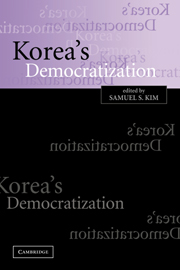Book contents
- Frontmatter
- Contents
- Tables and Figures
- Contributors
- Preface
- Part I A Framework of Analysis
- Part II Consolidation at the Mass Level
- Part III Consolidation at the Civil Society Level
- 3 Civil Society in Democratizing Korea
- 4 Redrafting Democratization Through Women's Representation and Participation in the Republic of Korea
- 5 Korean Nationalism, Anti-Americanism, and Democratic Consolidation
- Part IV Consolidation at the State Level
- Bibliography
- Index
5 - Korean Nationalism, Anti-Americanism, and Democratic Consolidation
Published online by Cambridge University Press: 29 July 2009
- Frontmatter
- Contents
- Tables and Figures
- Contributors
- Preface
- Part I A Framework of Analysis
- Part II Consolidation at the Mass Level
- Part III Consolidation at the Civil Society Level
- 3 Civil Society in Democratizing Korea
- 4 Redrafting Democratization Through Women's Representation and Participation in the Republic of Korea
- 5 Korean Nationalism, Anti-Americanism, and Democratic Consolidation
- Part IV Consolidation at the State Level
- Bibliography
- Index
Summary
In 1989, during the transition phase of Korea's democratization, Jinwung Kim observed that Koreans were sharing “new stirrings of nationalism arising from their country's rapid economic growth and political liberalization” and that this new nationalism had stirred antiforeign sentiments aimed mainly at “Korea's ‘big brother,’ the United States.” In the 1990s, scholars, policymakers, and the media in both the United States and South Korea continued to note an upswing and “mainstreaming” of anti-Americanism that were attributed to a resurgent nationalism and a rejection of authoritarianism. For example, based on several nationwide surveys conducted in Korea in the early 1990s, Gi-Wook Shin concluded: “anti-Americanism is not confined to any particular strata, but is widespread in South Korean society.” However, he found that Korean anti-Americanism was neither an ideological rejection of the United States as representative of capitalism and modernity nor a rejection of American culture. Rather, “national consciousness” and “nationalist concerns” served as the primary political source of anti-Americanism.
In Korea, unlike in Germany or Japan at that time (the mid-1990s), “the presence of American military forces [had] not provoked strong reactions from the Korean people” although “continued misconduct of American soldiers … [had] recently begun generating a more negative picture.” But by the end of the decade, over 100 Korean civic organizations had joined together to voice their criticism of Korea–U.S. relations, particularly on the 1967 Status of Forces Agreement (SOFA) and the role and behavior of U.S. troops stationed in Korea.
- Type
- Chapter
- Information
- Korea's Democratization , pp. 135 - 158Publisher: Cambridge University PressPrint publication year: 2003
- 6
- Cited by



